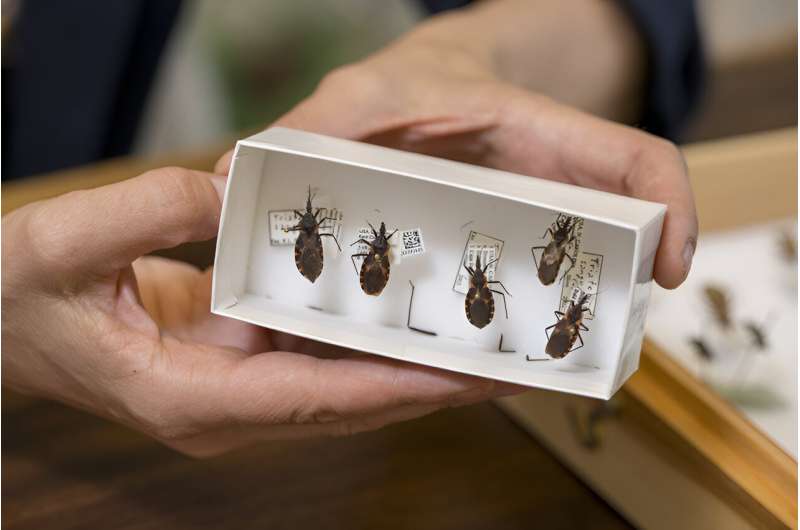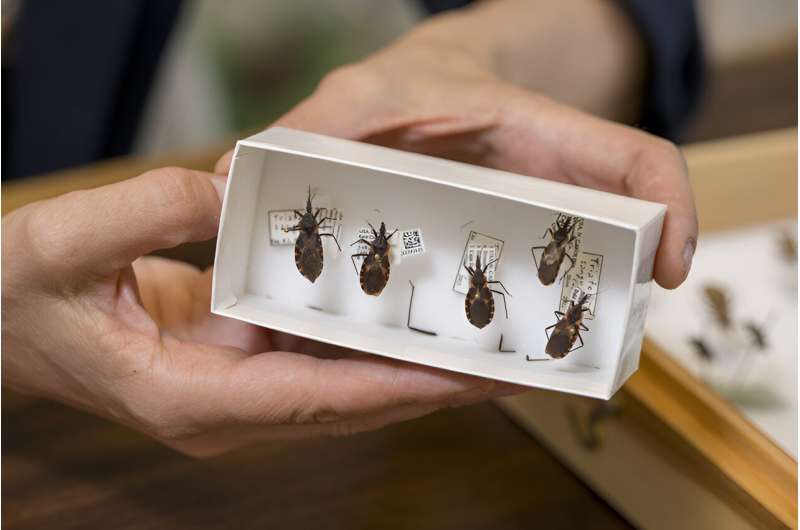In July 2023, a New Castle County resident was getting ready for bed when they pulled back their comforter and saw a large black and orange insect sitting on their pillow.
Three months later, the same resident found another specimen of the same insect on a cookie sheet in their kitchen. It was similar to the first one in size, shape and color.
University of Delaware entomologists confirmed the two insects to be the kissing bug species Triatoma sanguisuga. What’s more, the insect found on the homeowner’s pillow was confirmed to be infected with Trypanosoma cruzi, the parasite that causes Chagas disease, a parasitic infection characterized by flu-like symptoms shortly after infection followed by a years-long phase where the parasite quietly reproduces in its hosts’ tissues.
If left untreated, the infection can ultimately lead to serious heart problems or even death. Studies have found infection prevalences between 30% and 60% in kissing bugs in other parts of the U.S.
UD researchers detail the discovery of the two kissing bugs in a new paper published in the American Journal of Tropical Medicine and Hygiene. The authors say the presence of a kissing bug infected with the parasite Trympanosoma cruzi in a Delaware homeowner’s bed is concerning, though not unexpected, given the high percentage of these bugs in the Mid-Atlantic region.
“It’s not surprising that it was infected,” said Jennifer K. Peterson, a UD assistant professor and medical entomologist and the faculty member who identified the two specimens as kissing bugs. “It’s more of a wake-up call that this bug needs to be studied.”
A wild goose chase
Kissing bugs infected with T. cruzi transmit the parasite through their excrement. The likelihood of a kissing bug biting a person then defecating on the wound and transmitting the parasite is low, “but like any sort of thing, the more times you roll the dice, the more likely you are to get the most unlikely combination,” Peterson said.
This is not the first time a kissing bug has been confirmed in Delaware. It is, however, the first time a kissing bug in Delaware has been confirmed to have the Chagas disease-causing parasite T. cruzi. Chagas disease is estimated to affect 6–7 million people around the world.
Peterson said kissing bugs are likely native to the Northeast and Mid-Atlantic and have been here for thousands of years. But they’re understudied in our region.

The fact that two were found in the same home months apart isn’t surprising to Peterson. She said the home was in an area of farmland and forest fragments. Kissing bugs tend to live in natural areas, but they’re driven by food.
“If there is not enough food in the forest and a kissing bug sees some twinkling lights coming from someone’s house, it’s going to fly in and see if there is a meal,” Peterson said.
In the new paper, the researchers detail the long and frustrating course the homeowner took to get answers after they found the first insect on their pillow. The resident went on a wild goose chase to confirm if the bug was a kissing bug, and if so, get testing for Chagas disease.
When the homeowner found the first insect in July, they immediately began to seek answers. After contacting the Centers for Disease Control and Prevention, the CDC recommended the homeowner call their county health department.
Since Delaware does not have county health departments, the homeowner called the Delaware Department of Health and Social Services. The homeowner then called back the CDC, which gave them the phone number for a pest company that could identify the insect. When the pest company couldn’t ID it, the company referred the homeowner to UD Cooperative Extension.
Cooperative Extension identified the insect down to the order Hemiptera. A couple months later, when Peterson joined the UD Department of Entomology and Wildlife Ecology as a faculty member, she identified it down to species.
By early October, Extension got back in touch with the homeowner and referred them to Peterson. Upon getting in touch, the homeowner told Peterson that they had found a second specimen in their kitchen the night prior.
It also took months for the homeowner to get tested for T. cruzi antibodies, which indicate infection. The homeowner reached out to their primary care physician, who did not know what to do, so the physician reached out to two infectious disease doctors.
Eventually, the homeowner was tested for T. cruzi antibodies and the test results came back negative, meaning the homeowner probably did not have Chagas disease.
Although the homeowner eventually got answers and relief provided by the negative test, the case represents a systemic gap that needs to be addressed, Peterson said.
“The bugs are here,” Peterson said. “They’re making contact with people. This paper was written to illustrate that there is a hole in the system.”

Closing the gap
Peterson doesn’t blame anyone or anything in particular for the knowledge gap on the kissing bug T. sanguisuga, the parasite T. cruzi, and their prevalence in Delaware. She is simply setting out to close that gap and help others avoid instances like the New Castle County homeowner’s lengthy pursuit and the anxiety they faced trying to get answers.
Peterson is studying the kissing bug in Delaware over the summer. She is working with graduate students Alex Kelley and Hanna Cortes and Summer Scholars Alex Hemelt and Jillian Tunstall to catch kissing bugs at various sites across the top two-thirds of Delaware and test them for the T. cruzi parasite.
“You can get so much information just from testing them,” Peterson said. “You can put a little of the stomach contents of each bug on a forensics rapid test and it can tell you in an hour or two if there was human blood in the bug. Then you know if it came into contact with people.”
The goal is to find out where the kissing bug is, what it is eating, where it is breeding and the infection prevalence of the T. cruzi parasite.
“I hesitate to say that people need to be concerned or worried,” Peterson said. “Rather, I am a proponent of arming oneself with knowledge.”
Once the research team has collected enough data to form a more specific picture of the kissing bug and its parasite’s prevalence in the region, Peterson hopes to create a readily available resource for members of the public to consult should they find a kissing bug.
“It could be something like an app or public awareness campaign that can ensure that people can quickly get the information or help they need if they come into contact with one of these insects,” Peterson said.
Learn more about how to identify a kissing bug, how to safely handle a kissing bug, and how to protect yourself in a downloadable identification guide.
More information:
Jennifer K. Peterson et al, First Report of Chagas Disease Vector Species Triatoma sanguisuga (Hemiptera: Reduviidae) Infected with Trypanosoma cruzi in Delaware, The American Journal of Tropical Medicine and Hygiene (2024). DOI: 10.4269/ajtmh.23-0915
Citation:
Unearthing an understudied disease vector in Delaware (2024, June 26)
retrieved 26 June 2024
from https://medicalxpress.com/news/2024-06-unearthing-understudied-disease-vector-delaware.html
This document is subject to copyright. Apart from any fair dealing for the purpose of private study or research, no
part may be reproduced without the written permission. The content is provided for information purposes only.

